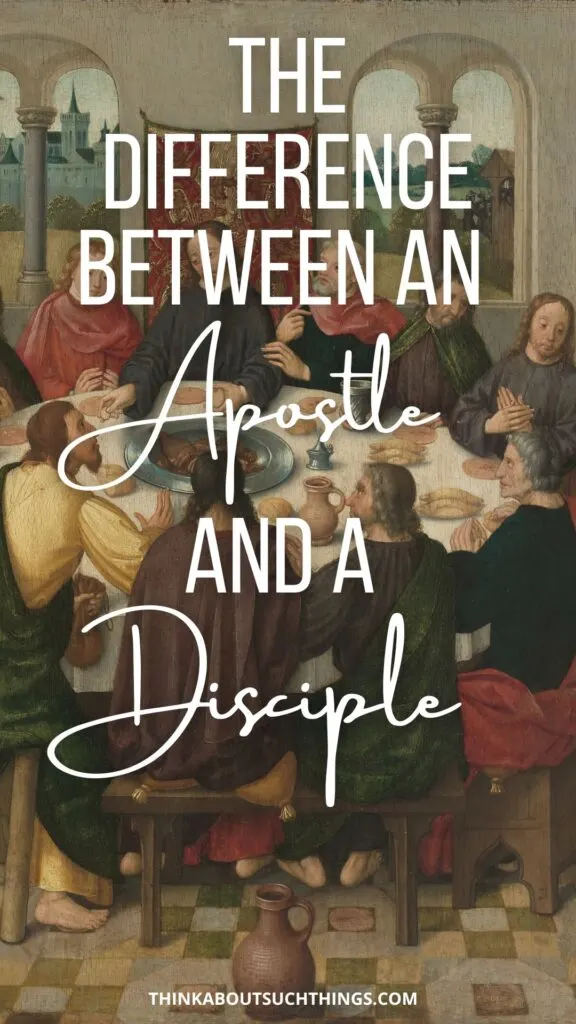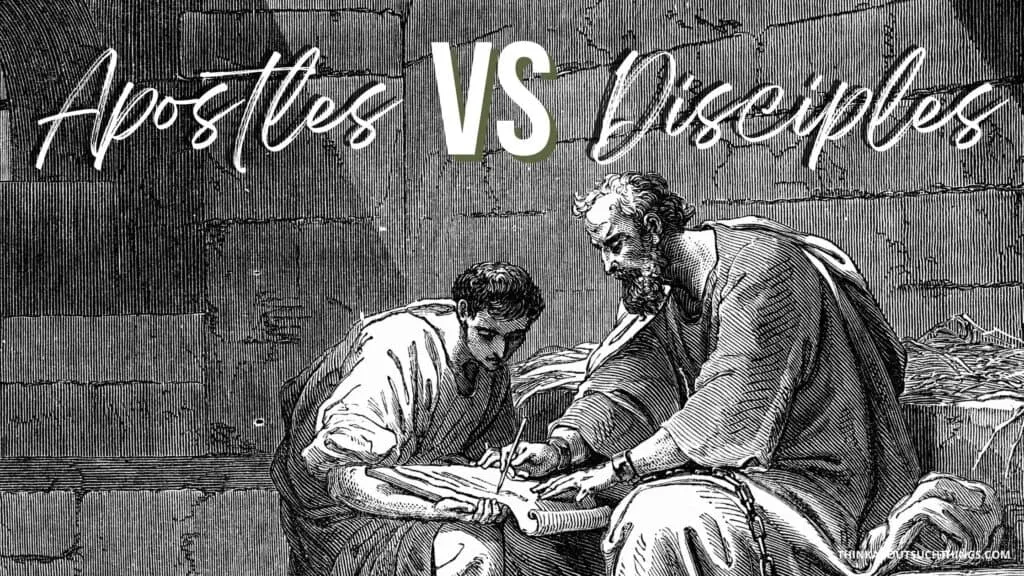In this article, we will explore what the difference between an apostle and a disciple and learn of their similarities and differences. So, grab your Bible, and let’s dig in…
If you have been around Think About Such Things, you will know I love digging into God’s Word and learning all kinds of things. A while back, I did a post on the What Is the Difference Between Praise and Worship?, What Is the Difference Between Dreams and Visions?, and The Key Difference Between Pharisees And Sadducees. This time around we are going to look at apostles and disciples.
The words Apostle and Disciple are often used interchangeably in Christian circles, primarily when referring to Jesus’ twelve closest followers, the ones He called to follow Him. Even in the Bible, it sometimes seems as if the words are used interchangeably. But these two do not mean the same thing. So what is the difference between an Apostle and a Disciple precisely?
The word Disciple literally means “a student, one who learns.” It is interpreted in Biblical terms as someone who follows Jesus to learn from Him. The word “Apostle” means “someone sent with a message.” All Apostles should also be Disciples, but not all Disciples are Apostles.

The meanings of these two words are vastly different, especially when we go back to their Greek meanings and interpretations. But within the context of the church, they are tied to one another in a very intricate way that many secular companies and organizations have even duplicated. Let’s compare these words by examining what the Bible says about them.
Disciple Vs. Apostle: What Is The Difference?
To understand the difference between a Disciple and an Apostle, we should compare them on two different levels: the literal Greek meanings and origins of both words and their Biblical context and use.
What Does “Disciple” Mean?
The first time disciple is mentioned in the KJV is in Isaiah 8:16. It is the only reference in all of the Old Testament. The word used in Hebrew is, limmûḏ. This is what the Strong’s Concordance has to say about it…
לִמּוּד limmûwd, lim-mood’; or לִמֻּד limmud; from H3925; instructed:—accustomed, disciple, learned, taught, used.
Outline of Biblical Usage
- taught, learned, discipled
- taught
- accustomed to (something)
Now, in the New Testament we see the word disciple(s) mentioned 255. This is the Greek word, mathētēs. According to the Strong’s we see it’s connected with the word pupil which relates to a young student.
μαθητής mathētḗs, math-ay-tes’; from G3129; a learner, i.e. pupil:—disciple.
Outline of Biblical Usage
- a learner, pupil, disciple
Let’s move it forward a bit to our day and age….
We get the modern word “disciple” from the Latin word “discipulus,” which literally means “student, learner, or follower.” The term Discipulus was adopted from the Catholic church by the English language and eventually became the word “Disciple” as we know it today, but it retains its meaning.
However, the word used for a Disciple in the Greek New Testament writings is “mathētēs” which refers to a student, pupil, apprentice, or adherent. As with many words, some parts of this meaning were lost as it was translated to Latin.
Looking at the whole Greek meaning, we can see that a disciple isn’t simply someone who studies or learns, though that is also a part of it. The words “adherent” and “apprentice” illustrate a much more active way of learning. It suggests getting out of the lecture hall and following a person to see how they do things, assisting them, and learning in an “on-the-job” way.
I like what the Lexham Theological Wordbook says…
A disciple is not only a partaker of information, but also one who seeks to become like his
Chris Byrley, “Discipleship,” ed. Douglas Mangum et al., Lexham Theological Wordbook, Lexham Bible
or her teacher (Luke 6:40). In this way, discipleship is about modifying one’s entire lifestyle. The term
mathētēs is often used of the group of people that followed Jesus in his earthly ministry, whether the
Twelve themselves (e.g., Mark 6:45) or some larger group (e.g., Luke 19:37).
Sometimes the disciples of other leaders are mentioned and contrasted with those of Jesus—e.g., some people approach Jesus to ask why the disciples of Jesus do not fast while those of the Pharisees and of John do (Mark 2:18). The related feminine word μαθήτρια (mathētria, “[female] disciple”) is used in Acts 9:32 to refer to Tabitha.
Reference Series
It means dedicating yourself to learning everything that you can from this person, not leaving their side, and being committed to becoming every bit as proficient as they are at what they are doing.
When we are born again, this is the stance we are supposed to take. We don’t just become saved by Jesus, but we become disciples of Jesus!
What Does “Apostle” Mean?
And He Himself gave some to be apostles….
— Ephesians 4:11
The word apostle is adopted from the Greek word “Apostolos,” which means “messenger” or, more specifically, “one sent with a message.” The difference is essential since the word “sent” changes everything, but more on that later.
The word, apostle(s) is only found in the New Testament and is mentioned 25 times.
ἀπόστολος apóstolos, ap-os’-tol-os; from G649; a delegate; specially, an ambassador of the Gospel; officially a commissioner of Christ (“apostle”) (with miraculous powers):—apostle, messenger, he that is sent.
Outline of Biblical Usage
- a delegate, messenger, one sent forth with orders
- specifically applied to the twelve apostles of Christ
- in a broader sense applied to other eminent Christian teachers
- of Barnabas
- of Timothy and Silvanus
So whereas a Disciple is someone who, like an apprentice, spends time with a teacher to learn the necessary skills and find out how things should be done, becoming a virtual “clone” of their teacher, an Apostle is someone who is sent to carry a message to someone else.
>> Check Out: The Ultimate Sacrifice: How Did The Apostles Die?
An IMPORTANT Historical look at Apostles
It’s easy to think that the word apostle was introduced to the world from the Bible or Christianity. But the truth is that it was a military term used both by the Greeks and Romans. A Greek orator Demosthenes said that the word apostolos was a naval term. It’s what we would call an admiral. Here is some more interesting insight from the 1836 book, Lives of the Apostles.
The fleet would be sent out to sea on a mission to locate territories where civilization was nonexistent. Once an uncivilized region was identified, the admiral (called the apostolos) — along with his specialized crew and all their cargo and belongings
— would disembark, settle down, and work as a team to establish a new community. Then they would begin the process of transforming a strange land into a replica of life as they believed it should be. Their purpose was total colonization of the uncivilized territory.Within this special fleet of ships were both the personnel and the cargo required to establish a new culture, a new life, and a new community. When that fleet pulled up to shore, it contained workers trained to build roads, construct buildings, and teach uncivilized natives how to read, write, and function in a new kind of social order. Thus, the admiral became the team leader for the construction of a new society.
Once the job was completed, a majority of the team members got back on the ships and launched out to sea again to find another uncivilized area and repeat the entire colonization process all over again. Thus, we find that the word apostolos described an admiral or team leader who led a team to establish new communities in uncivilized territories.
Lives of the apostles of Jesus Christ by David Francis Bacon
I firmly believe this is important to keep in mind when looking at the meaning of apostle. When Jesus used the word, He understood the historical context. An apostle was one who brought a message but also one who carried a level of authority, leadership, and ability to impart God’s Kingdom to a new territory. An apostle is a delegate and ambassador for God.
Biblical Interpretations Of Apostle And Disciple

It’s very easy to get disciples and apostles confused. The simple cause of this confusion is that, at the beginning of the New Testament, both of these terms refer to the same twelve men. But there is a very good reason for this.
Disciples In The New Testament
With only one reference in the Old Testament, it may seem like we don’t have much to go on. But that’s not true at all. Even though the word isn’t mentioned it is seen throughout the stories of the men and women of God.
For example, Elisha was a disciple of Elijah, and Samuel was a disciple of Eli. In fact, it was common practice among prophets, and later Rabbis, to call certain people to follow them and learn from them. These people then became disciples of the teacher.
The first occurrence of the word Disciple in the Bible is in the New Testament, in the book of Matthew.
In Matthew 10:1 Jesus says, “A disciple is not above his teacher, nor a servant above his master.” The word then occurs another 250+ times, all within the context of the twelve except for a handful of exceptions. (Note that the word is sometimes translated as “follower” or “student.”)
The first exception is in Matthew 28:19, where Jesus instructs the twelve to “go therefore and make disciples…” Further exceptions occur in the book of Acts, which often refers to disciples that are not part of the original twelve, like Ananias in Acts 9:10. These exceptions prove that the twelve are not Jesus’ only disciples, just that they were the first.
Apostles In The New Testament
Now the names of the twelve apostles are these; The first, Simon, who is called Peter, and Andrew his brother; James the son of Zebedee, and John his brother; Philip, and Bartholomew; Thomas, and Matthew the publican; James the son of Alphaeus, and Lebbaeus, whose surname was Thaddaeus;Simon the Canaanite, and Judas Iscariot, who also betrayed him. – Matthew 10:2-4
The word Apostle is first mentioned in Matthew 10:2, where Matthew lists the names of the twelve. In fact, each occurrence of the word Apostle in the gospels also refers to the twelve. Still, from Acts and later in the epistles, there are references that others can be Apostles, the first example being Paul according to 1 Cor. 1:1.
When we look at Mark 3:14, we can see the first reason the original twelve are both Disciples and Apostles:
“Then He appointed twelve, that they might be with Him and that He might send them out to preach…”
So, Jesus called and appointed the twelve firstly to be with Him (Disciples), and then he sent them out (Apostles, or “ones sent with a message”). The twelve were disciples and apostles at the same time!
Can A Disciple And An Apostle Be The Same Thing?

The passage in Mark 3:14 should prove that one person can be both a disciple and an apostle. But what makes the difference?
To state it simply, we are all called to be disciples. Every follower of Jesus is a disciple and should be following Him like an apprentice, learning from Him so that we can become more and more like Him. There are no exceptions to this.
We can see in Mark 3 and Luke 6:13 that Jesus had more than just twelve Disciples (see in Luke 6 that Jesus chose twelve people from His disciples and called them Apostles by sending them out to preach).
This indicates that everyone who followed Him to learn from Him was a Disciple. So even an Apostle should be a Disciple first and foremost.
But what about the other way around? Can all disciples be apostles? To some extent, yes. All believers are told to spread the gospel, so in a way, we are all “sent with a message.” But there is more to an apostle. Check the historical section if you skipped it.
Ephesians 4:11 says, “And He Himself gave some to be apostles, some prophets, some evangelists, and some pastors and teachers, for the equipping of the saints for the work of the ministry…”
These are called the Gifts of Christ or the 5 fold ministry. It is a particular calling and gifting that comes from God. Like I mentioned earlier…An apostle was one who brought a message but also one who carried a level of authority, leadership, and ability to impart God’s Kingdom to a new territory.
This points towards a particular Apostle who is “sent with a message” specifically for the purpose of equipping the saints and edifying the church.
But note two things about these appointed Apostles:
- They are to equip the saints for the work of the ministry. Why would the saints (Disciples) need equipping for the work of the ministry if they are not to work for the ministry? All disciples are apprentices of Jesus with the purpose of working in His Kingdom just like Him. An apprentice who isn’t planning to work with his skills is wasting his time.
- Apostles should be in a servant role. They are equipping the church, not ruling over it for control or power or while flaunting their success. All of the apostles of the New Testament suffered in their roles. They were persecuted, tortured, and executed. Take a look at Paul’s “CV” that qualified him as an Apostle in 2 Cor. 11:16-33.
So, all apostles should be disciples first. An apostle who isn’t demonstrating their discipleship is failing at their first and most foundational calling. But not all disciples will have the gift or calling of an apostle.
The Difference Between An Apostle And A Disciple – My Final Thoughts
Disciples and Apostles don’t mean the same thing, though some people may be both. Discipleship is the foundation of being an apostle, and some elements of apostleship are included in the responsibilities of all disciples. But we should stop using these two terms interchangeably, and understanding the difference can help and encourage us to dive deeper into our study of the Bible!
Well, I hope this article has answered the question, what is the difference between an apostle and a disciple. I pray that God stirs

Melissa is a passionate minister, speaker and an ongoing learner of the Bible. She has been involved in church and vocational ministry for over 18 years. And is the founder of Think About Such Things. She has the heart to equip the saints by helping them get into the Word of God and fall more in love with Jesus. She also enjoys family, cooking, and reading.
She has spoken in churches in California, Oregon, Texas, and Mexico and has been featured in Guidepost Magazine and All Recipes Magazine. Read More…
